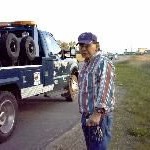In Memoriam – Roland J. Morris Sr.
.
REMEMBERING ROLAND AND WHAT HE STOOD FOR:
All Tribal Members have a Right to choose their OWN path.
Neither tribal government nor Congress has a right to tell tribal members how they are supposed to think, act and feel.
Many Tribal Members have chosen to leave Indian Country. This is their Right. Many Tribal Members have chosen to follow Jesus Christ. This is their Right.
Laws such as IWCA and VAWA are misguided. They infringe on Freedom of Religion and Freedom of Association. They infringe on the rights of Birth Parents to raise their children Irish if they so choose – or the right of individuals to have their cases heard before County Courts.
In the case of the VAWA – it is an affront and a second assault on woman to be forced to go before a tribal court judge when they may not want to because the perpetrator is the Judge’s nephew, or because the clan running the court has been historically harsh toward the woman and/or her family.
~~~~~~~~~~~~~~~~~~~~~~~~~~~~~~~~~~~~~~~~~~~~~~~
July 1, 1945 – June 9, 2004
Roland Morris, Sr., 58, ascended to heaven on Wednesday, June 9th after a four year fight with cancer. Roland, a member of the Minnesota Chippewa Tribe, was born July 1, 1945, in Cass Lake, MN. Ojibwe was his first language, and he grew up fishing, hunting, and gathering wild rice with family and friends. He also played intramural basketball, worked hard in the woods, spent time in a foster home and various jails, drank, smoked, and played guitar with friends at various bars.
 Roland went to college in Kansas and was a draftsman for a short time before becoming an upholsterer. While he struggled with many difficulties in his early years, he was a perfectionist with upholstery and throughout his life performed his craft well.
Roland went to college in Kansas and was a draftsman for a short time before becoming an upholsterer. While he struggled with many difficulties in his early years, he was a perfectionist with upholstery and throughout his life performed his craft well.
After a life changing spiritual experience with Jesus in 1988, Roland moved his second family to Ronan, Montana to be near his cousin and Christian evangelist, Frank (Scotty) Butterfly. There, in 1992, Roland and his wife, Elizabeth, created Montana’s first patient transportation service, Mission Valley Medicab. They also helped instigate the Montana Passenger Carriers Association and the charitable organization, Valley Missions, Inc., all without tribal assistance.
 Roland taught his children about wild ricing, hunting, fishing, and a little of the Ojibwe language. But the biggest, strongest desire of his heart was that his children, grandchildren, and entire extended family come to the saving knowledge and acceptance of Jesus Christ. Having watched many friends and relatives die physically, spiritually, and emotionally from alcoholism, violence, and suicide, Roland could no longer stand aside and do nothing. He was concerned for the children and felt distress at the attitudes of many adults within his community. He wanted the self-destruction to stop.
Roland taught his children about wild ricing, hunting, fishing, and a little of the Ojibwe language. But the biggest, strongest desire of his heart was that his children, grandchildren, and entire extended family come to the saving knowledge and acceptance of Jesus Christ. Having watched many friends and relatives die physically, spiritually, and emotionally from alcoholism, violence, and suicide, Roland could no longer stand aside and do nothing. He was concerned for the children and felt distress at the attitudes of many adults within his community. He wanted the self-destruction to stop.
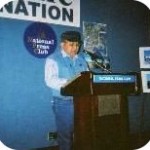 Roland’s relationship with Jesus coupled with his conviction that much of the reservation system was harmful led him to some amazing life experiences. Actively opposing much of federal Indian policy, Roland served as President of the Western Montana organization All Citizens Equal, was a board member and Vice-Chairman of the national organization; Citizens Equal Rights Alliance, was the Secretary of Citizens Equal Rights Foundation.
Roland’s relationship with Jesus coupled with his conviction that much of the reservation system was harmful led him to some amazing life experiences. Actively opposing much of federal Indian policy, Roland served as President of the Western Montana organization All Citizens Equal, was a board member and Vice-Chairman of the national organization; Citizens Equal Rights Alliance, was the Secretary of Citizens Equal Rights Foundation.
He also ran as a Republican candidate for the Montana House of Representatives in the 1996 and testified before the US Senate Committee on Indian Affairs in April,1998, the Minnesota Attorney General in 2000, and numerous Mont. State committees. With his family, he also had a private meeting with a member of the President’s Domestic Policy Council May, 2002 in Washington DC.
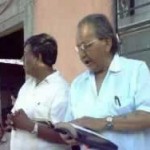 As time progressed, Roland became more convinced of the importance of Jesus in his life. So in 2000 he attended a year of training at the Living Faith Bible College, Canada. Over the last three years, he and/or his family went on mission trips in Canada and Mexico. During a 2003 trip to a children’s home in Juarez, Mexico, he fixed most of their dining hall chairs, taught 6 boys how to upholster, donated materials, and preached a Sunday street service.
As time progressed, Roland became more convinced of the importance of Jesus in his life. So in 2000 he attended a year of training at the Living Faith Bible College, Canada. Over the last three years, he and/or his family went on mission trips in Canada and Mexico. During a 2003 trip to a children’s home in Juarez, Mexico, he fixed most of their dining hall chairs, taught 6 boys how to upholster, donated materials, and preached a Sunday street service.
Through the years, he has appeared in numerous newspaper articles across the country. The last article he appeared in was on Friday, May 14th, in the Washington Times. Reporter Jennifer Lehner wrote, “the ICWA [Indian Child Welfare Act] protects the interests of others over [Mr. Morris’] grandchildren,” and “Mr. Morris said that once children are relocated to the reservations, they are subject to the corrupt law of the tribal government. Instead of preserving culture, he said, the tribal leadership uses the ICWA to acquire funds provided through the legislation.” Ms. Lehner quoted Mr. Morris as saying that the law is “supposed to help children, but instead it helps tribal governments.”
Finally, in February, 2004, he and his wife founded the Christian Alliance for Indian Child Welfare. The purpose of this was to encourage preaching, teaching and fostering of the growth of the Christian Faith in all places, encourage accountability of governments to families with Indian heritage, and educate the public about Indian rights, laws, and issues.
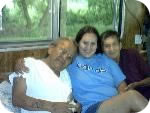 Roland praised God to the very end. When his final struggle began, several of his friends and family were praying with him. When those present sang old-time hymns, he raised his hand in the air for as long as he could. When “I Surrender” was sung, he sang the echo. While Pastor Kingery sat next to Roland, holding his hand, Roland looked him straight in the eyes and pointed his other hand up to heaven. When he passed on to greater life, his good friend Marvin Bauer was softly playing Gospel songs for him on his accordion.
Roland praised God to the very end. When his final struggle began, several of his friends and family were praying with him. When those present sang old-time hymns, he raised his hand in the air for as long as he could. When “I Surrender” was sung, he sang the echo. While Pastor Kingery sat next to Roland, holding his hand, Roland looked him straight in the eyes and pointed his other hand up to heaven. When he passed on to greater life, his good friend Marvin Bauer was softly playing Gospel songs for him on his accordion.
Roland is survived by his wife, nine children, twelve grandchildren and a great grandson. Also important to his heart was his “special” son, Jesus Garcia, in Juarez, Mexico. Surviving brothers include Harry Morris and Steven Jones; and sisters include Clara Smith, Bernice Hurd, Sharon Goose, and Christine Jones, as well as numerous nephews and nieces and his great cousin, Scotty Butterfly.
Roland was preceded in death by his parents, Jacob and Susan Jones; siblings Thomas and Wallace Morris, Robert, Martin, Caroline, Frances, Barbara and Alvina Jones, Loretta Smith, and grandson Brandon Kier.
Roland’s loving friend, Jim Ball, crafted a beautiful casket for him as a gift. Funeral services were at the CMA Church in Ronan, MT, on Sunday, June 13, 2004 and the CMA Church in Cass Lake, MN, Tuesday, June 15. Internment was at Prince of Peace Cemetery. He is strongly remembered for his strength, character, and love for the Lord Jesus.
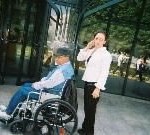 Roland, our husband, father, grandfather, brother, uncle, cousin, and friend; We Love you and Miss you so very much. You are with God now.
Roland, our husband, father, grandfather, brother, uncle, cousin, and friend; We Love you and Miss you so very much. You are with God now.
Gi gi wah ba min me na wah.
Click here to watch Roland’s Last Mission Trip – Music Video
______________________________________________________________________
The Rub Tree; By Don Burgess
From “The Bugle,” a publication of the Rocky Mountain Elk Foundation, Jan/Feb 2005 edition.
Cancer had clamped onto Roland like a wolf on an elk’s rear end, and was finally taking him down. Saying our goodbyes up in the hospital room, we recalled some of our hunts. It was a bittersweet time, but far from depressing because Roland was a most peaceful man. He had no fear of dying or anything else that I know of.
A full-blood Chippewa, born and raised in Minnesota’s wild rice country, Roland knew some traditional “medicine” – and a lot of Twin Cities trouble. In his late 30s he’d moved to Montana and started a new family and a new life as a Christian. He viewed the spirit as a person’s most vital organ and had figured out how to keep his cancer-free in the face of all manner of difficulties. Looking out the window, oxygen tubes taped in his nostrils, he whispered, “Remember that time we got lost?”
I could see him standing on a snow-covered Montana ridge in his black stocking cap and faded orange vest, waiting for me to figure out how to get us back to his rig. But I’d taken a wrong turn late that afternoon and wound up with a blowdown-strewn chasm between us and where we needed to be. We dropped into the canyon, clawed our way up the far side in snow above our knees and didn’t get back to his rig until well after dark.
Earlier that day we’d cut fresh elk tracks leading down off a ridge into a little basin. Roland looped downhill, staying well to the right of the tracks, while I sidehilled left around the top of the basin. On the far side the breeze said “elk” loud and clear, and I followed the scent-stream downslope toward a copse of Doug fir. Figuring there had to be elk in there and they’d come out when Roland went by on the other side, I sat down and got ready. No elk showed, and when Roland reappeared I angled down to him, wondering how my nose could have been so wrong.
When he said he’d heard dome loud purring coming from that thicket, I knew my nose hadn’t lied. We’d seen cat tracks earlier, and it didn’t take too much ciphering to conclude that there was an elk in there, and Roland had been within a few yards of the happy lion that killed it.
The lion had to have heard and scented him, and I liked the idea of it purring away as he sauntered by. Roland was apparently as unperturbed as the lion, and I wondered where all the equanimity was coming from. I’d have been purring too if I had an elk down, but I tended to thrive on the intensity, danger, extreme-sports brand of hunting, and I wasn’t inclined to be so relaxed around my fellow predators. I had never hunted with anyone who wasn’t keyed up about such things, and Roland’s easy ways mystified me.
On another hunt, Roland’s bullet broke the back of a young mule deer buck. He walked slowly up to the struggling animal and circled it once, then stood there looking at it. Watching from a few yards behind him, I grew agitated, wishing he would get it over with, and I thought about doing it myself but held off. The deer soon grew calm and Roland killed it. Later, I asked him why he took so long, and he said he’d been thanking the deer and wishing it well. He wasn’t talking out loud, so I guess it was a spirit-to-spirit thing.
My sense of the meaning of coup de grace wavered and shifted after that; quick is good when it comes to delivering death, but I began to think maybe it’s also good to wait for – or establish – a moment of tranquility. Clearly, though, you’d have to have it before you could pass it on.
Up in the hospital, remembering that elk hunt years ago, we got to the part where we finally got back to Roland’s van. As we headed down the road Roland pulled a couple of ice-cold Cokes from his cooler. I drank mine down and declared it was the best Coke I’d ever had. Roland agreed. Still thirsty, we each opened a second can. Roland said, “This is the second-best Coke I’ve ever had.” Maybe we were just giddy tired, but we laughed long and hard.
Up in the hospital room, the “second-best Coke” line made Roland laugh again. Then the pain cut it off, and as he bent forward with his right hand pressed against his chest, there was the old tattoo spelling out H-A-T-E across the back of his fingers, the part of his fist that would smack somebody if he punched them – a faded memento of difficult days on the far side of another chasm, years before that elk hunt.
When he got a little breath back, we prayed and hugged and said goodbye. Alone in the elevator I shed a couple of tears, but felt peaceful when the door opened on the ground floor…so peaceful it made me wonder if Roland was messing with me, spirit-to-spirit.
____end___
icwa is hurting families.blogspot.com
Dying in Indian Country.blogspot.com
Serving The Kings Tea.blogspot.com
© 2004-2012 Christian Alliance for Indian Child Welfare – All Rights Reserved
